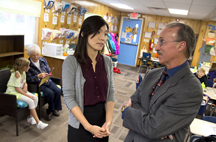Study: Older volunteers in better physical health than younger peers
October 24, 2013
 |
|
Adults 70 or older who regularly volunteer are in better physical health than those just a few years younger, according to new research from Purdue doctoral student Seoyoun Kim, from left, and distinguished professor of sociology Kenneth F. Ferraro. The sociologists found that older adults, ages 70-85, who regularly volunteered have younger biological profiles than those ages 58-69 who infrequently volunteer. Their research is published in The Gerontologist. Pictured in the background is Read to Succeed volunteer Janice Hooper with a Burnett Creek Elementary School student. (Purdue University photo/Mark Simons) |
WEST LAFAYETTE, Ind. - Adults 70 or older who regularly volunteer are in better physical health than those just a few years younger, according to new research from Purdue University.
The sociologists found that people ages 70-85 who regularly volunteered have younger biological profiles than those ages 58-69 who infrequently volunteer. They adjusted for a variety of factors, including whether the people in these age groups were in good enough physical health to volunteer.
"We looked at older adults engaging in a variety of productive activities, but there is something really distinctive about volunteering that positively affects a person's physical health, " said Seoyoun (pronounced Sigh-ON) Kim, a doctoral student in sociology and gerontology who led the study.
The study, which is published online in The Gerontologist, measured physical health and activities such as volunteering, caregiving, community engagement and employment of independent-living people. While there has been research on the positive relationship between volunteering and self-reported physical and mental health, this study evaluates a specific biomarker that more accurately reflects people's health.
"We believe we are the first to document this link by measuring chronic inflammation," said Kenneth F. Ferraro, a Purdue distinguished professor of sociology.
Previous studies look at self-reported physician-diagnosed diseases, self-reported health, or symptoms, which can be influenced by access to health care, the researchers said.
"By using a biomarker, which is like a canary in the mine, we can clinically detect a person's physiological health, whether it has been diagnosed or not," Ferraro said.
The C-reactive protein, known as CRP, increases with aging, and higher amounts are indicative of health problems such as cardiovascular and chronic disease. This protein was measured in the National Social Life, Health and Aging Project, which is a nationally representative sample of adults who answered questions about their health and provided a blood sample. The researchers for this study analyzed data collected in 2005-06 from 1,790 people ages 57-85.
They found that CRP was about 15 percent lower for people who volunteered several times per year than for those who did not volunteer during the past year.
"Why this effect? Older adults are either losing or reducing their involvement in highly institutionalized roles, such as retirement or their children leaving the home," Kim said. "Volunteering allows them to engage in meaningful roles and stay active."
There was no positive relationship between the other activities and CRP.
"Volunteering helps many people see what is important in life and how fortunate we are," Ferraro said. "Having the feeling that you are making difference in a person's life is powerful, and our own problems may not seem so important. I also think volunteering is special because one gets to select the nature of volunteering. You are not coerced; you have some choice in it."
The researchers also analyzed if too much volunteering was an issue, but they found no negative consequences for those who volunteered the most. CRP was lowest among those who volunteered several times per week - about 25 percent lower than for those who did not volunteer. The researchers will next examine the mechanisms between volunteering and physical health, as well as cultural differences.
"In gerontology we are interested in people living well as they live longer," Kim said. "The relationship between volunteering and inflammation is telling because it's related to their quality of life and disease prevention."
The research was supported by the National Institute on Aging and the National Research Foundation of Korea.
Writer: Amy Patterson Neubert, 765-494-9723, apatterson@purdue.edu
Sources: Kenneth F. Ferraro, ferraro@purdue.edu
Seoyoun Kim, kim585@purdue.edu
Related websites:
Purdue College of Liberal Arts
Purdue Center on Aging and the Life Course
Note to Journalists: Journalists interested in a copy of the journal article can contact Amy Patterson Neubert, Purdue News Service, at 765-494-9723, apatterson@purdue.edu
ABSTRACT
Do Productive Activities Reduce Inflammation in Later Life? Multiple Roles, Frequency of Activities, and C-Reactive Protein
Seoyoun Kim, MS, and Kenneth F. Ferraro, PhD
Purpose of the Study: The study investigates whether productive activities by older adults reduce bodily inflammation, as indicated by C-reactive protein (CRP), a biomeasure associated with the risk of cardiovascular diseases. Design and Methods: The study uses a representative survey of adults aged 57-85 from the National Social Life, Health and Aging Project (N = 1,790). Linear regression models were used to analyze the effects of multiple roles (employment, volunteering, attending meetings and caregiving) and the frequency of activity within each role on log values of CRP concentration (mg/L) drawn from assayed blood samples. Results: Number of roles for productive activities was associated with lower levels of CRP net of chronic conditions, lifestyle factors and socioeconomic resources. When specific types of activity were examined, volunteering manifested the strongest association with lower levels of inflammation, particularly in the 70+ group. There was no evidence that frequent engagement in volunteer activity was associated with heightened inflammation. Implications: Productive activities - and frequent volunteering in particular - may protect individuals from inflammation that is associated with increased risk of hypertension and cardiovascular disease.

